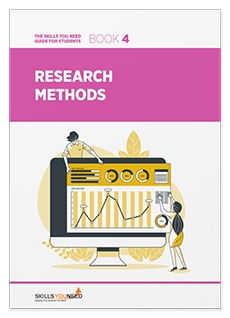Research Methods
See also: Writing a Research ProposalMost people first encounter research as part of a school or college course.
A piece of research is usually included in any advanced degree course, and may also be integral to undergraduate degrees. Basic research, such as issuing questionnaires, may be undertaken in social science classes at school.
But there are many more applications for quality research.
These include market research to discover customer preferences, or to establish whether a new product will sell, and focus groups to discuss politics.
Our Research Methods pages are designed to help you choose and then use the right research method for your purposes.
They cover the whole process of research, from understanding the philosophical theory underpinning your choice of method, through choosing the methods that you will use to answer your research question, to collecting data and then analysing it.
Introducing Research Methods
Your research method depends on the question that you wish to answer, and the philosophy that underpins your view of research.
The best place to start is our page An Introduction to Research Methods. This sets out the basic principles of research design, and the role of the researcher.
Our page on Designing Research explains how to approach research, and what to think about in designing your research. It sets out some possible research approaches, including experimental and quasi-experimental designs, survey research, and ethnography.
Finally, you need to make a decision about whether your research will be Qualitative or Quantitative, or even mixed.
Qualitative Research Designs
Qualitative research is concerned with human behaviour, and why people act the way that they do.
Common methods used for qualitative research include Interviews and Focus Groups and Group Interviews. Both these methods allow researchers to explore a topic in depth with one or two people at a time, or within a small group. You can also collect Qualitative Data from Interactions, in research that recognises that the researcher is a key part of the situation, rather than an outside observer.
Quantitative Research Designs
Quantitative research always collects numerical data.
If you are not collecting numbers, then your research is qualitative, not quantitative. Quantitative research is usually used to get views from large numbers of people.
The first step in quantitative research is to determine your Sampling and Sample Design. You then need to gather data. Suitable methods include surveys (and our page on Surveys and Survey Design explains more about this surprisingly complex subject).
Other sources of data include Observational and Secondary Data.
Analysing Research Data
Your choice of analysis method will depend heavily on your choice of research method.
For example, for qualitative research, you may need an approach like content analysis, because you will have generated large amounts of data, often narrative in form. Our page on Analysing Qualitative Data explains more.
Quantitative data is often analysed using statistical methods, which may be both simple and more complex, depending on the question you are trying to answer. Our page on Simple Statistical Analysis suggests some suitable starting points, with more information available on Understanding Correlations, Hypothesis Testing and Multivariate Analysis.
Further Reading on Research
Research methods can be used alone to solve a problem, or explore a question as part of a piece of work. They can also be a key part of writing a thesis or dissertation.
For more about this, see our section on Writing a Dissertation, and particularly Writing Your Methodology.
You may also find our page on Writing a Research Proposal useful when developing your ideas for your research. Not everyone is required to write a research proposal for every piece of research. However, the process of preparing a proposal can be helpful in making sure that your ideas are coherent, and that you have considered each aspect of the research, even if there is no formal process of approval.
Further Reading from Skills You Need
The Skills You Need Guide for Students

Develop the skills you need to make the most of your time as a student.
Our eBooks are ideal for students at all stages of education, school, college and university. They are full of easy-to-follow practical information that will help you to learn more effectively and get better grades.


